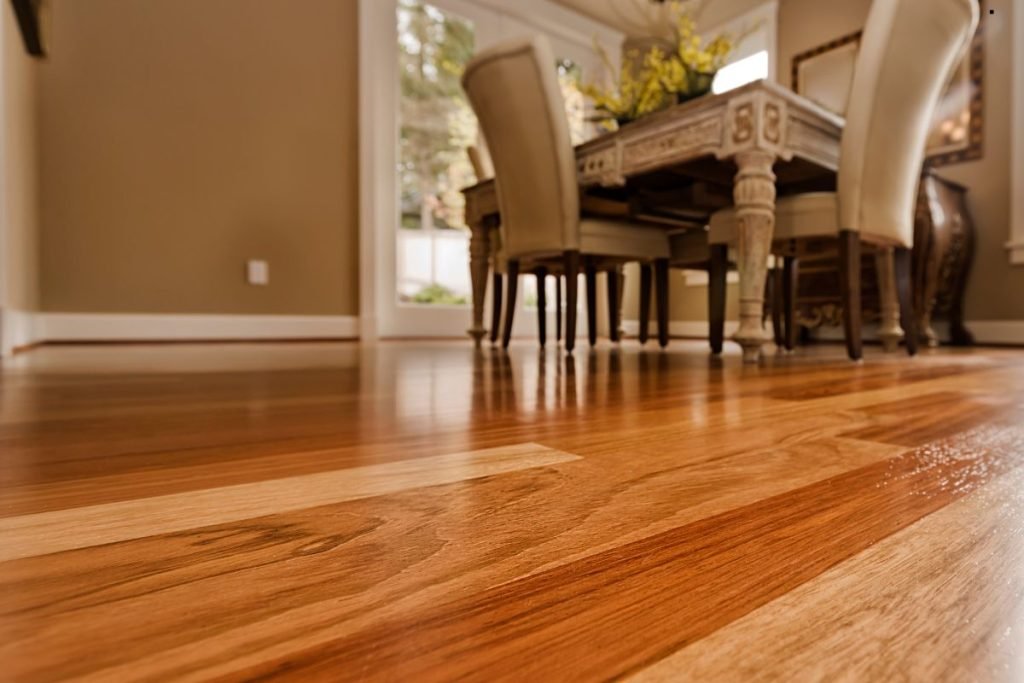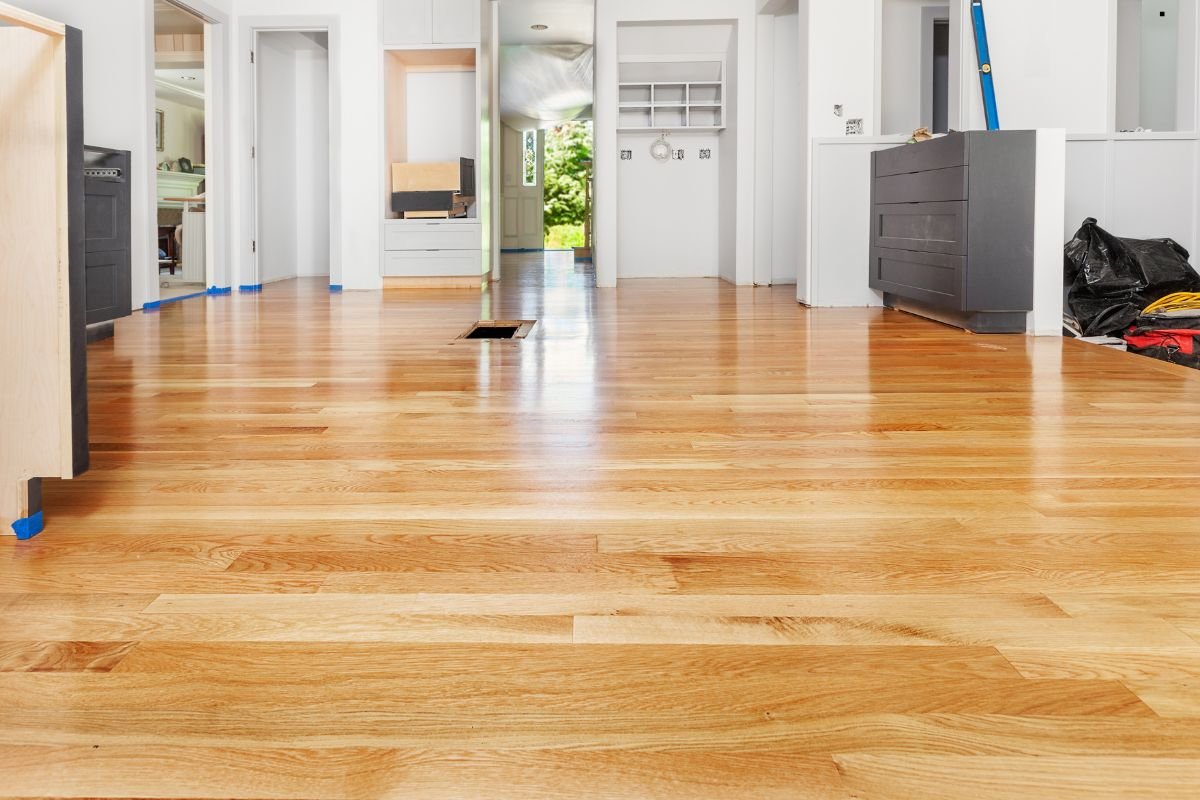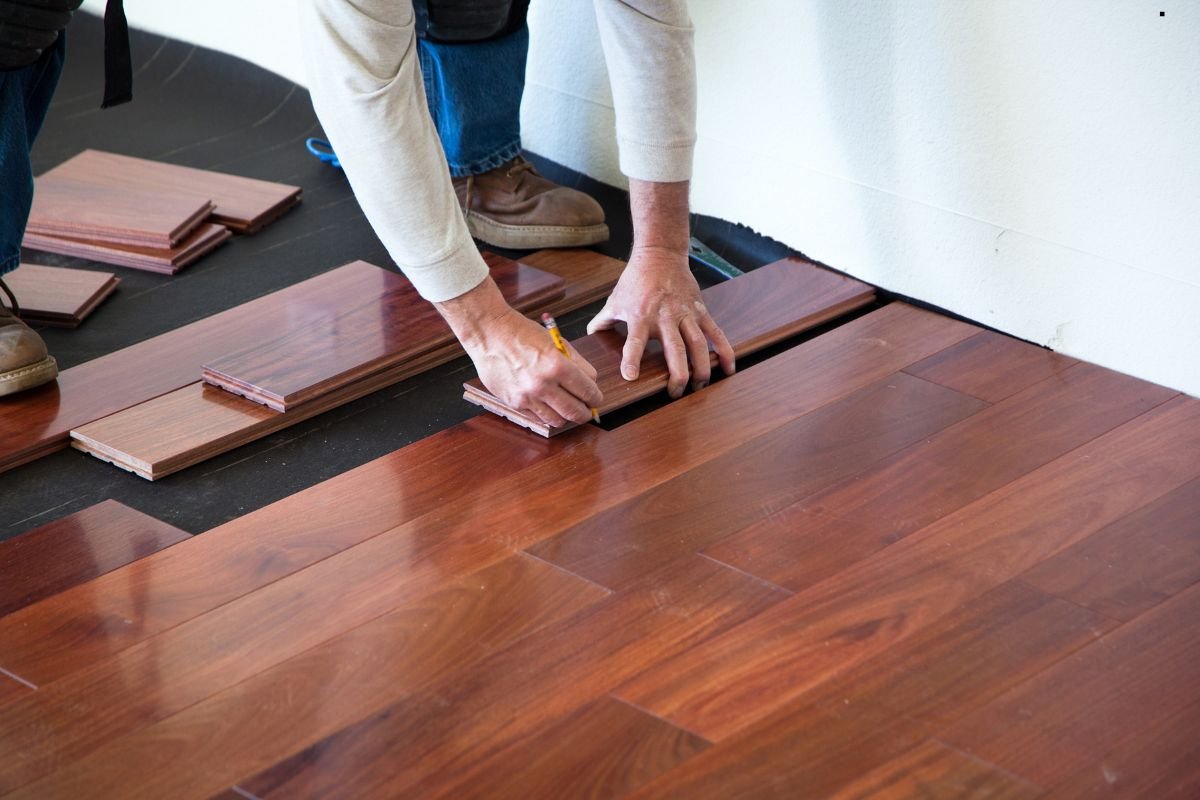
No, hybrid flooring is generally not 100% waterproof, but it is highly water-resistant, making it a popular and practical choice for many areas in Washington homes. While it can withstand spills and splashes, it’s important to understand its limitations and the factors affecting its water resistance to avoid potential damage. This article will delve into what makes hybrid flooring so appealing, its true capabilities, and how to make the best decision for your home.
What is Hybrid Flooring?
Hybrid flooring is an innovative solution that merges the top features of laminate and vinyl, offering exceptional durability, a natural look, and, most importantly, water resistance. Unlike traditional hardwood, which can warp or buckle when exposed to moisture, hybrid flooring is built to handle everyday spills and accidents with ease. We provide professional hybrid flooring installation services, ensuring a seamless and high-quality finish for your home or business.
What Makes Up Hybrid Flooring?
Hybrid flooring typically consists of several layers:
- Wear Layer: A durable top layer that protects the floor from scratches, stains, and fading.
- Decorative Layer: A high-definition printed layer that mimics the look of real wood, stone, or tile.
- Core: This is the heart of hybrid flooring and where it gets its water-resistant properties. The core is usually made of either:
- Stone Plastic Composite (SPC): Made from limestone and stabilizers, SPC is extremely rigid and dense, providing excellent water resistance.
- Wood Plastic Composite (WPC): Made from recycled wood and plastic, WPC is softer and more comfortable underfoot than SPC.
- Underlayment: Some hybrid flooring options come with a pre-attached underlayment for added comfort and sound insulation.
Understanding “Waterproof” vs. “Water-Resistant”

It’s crucial to distinguish between “waterproof” and “water-resistant.” Waterproof means the material is impervious to water, no matter the amount or duration of exposure. Water-resistant, on the other hand, means the material can resist water penetration to some degree, but prolonged or excessive exposure can still lead to damage.
Hybrid flooring falls into the water-resistant category. Its core material, whether SPC or WPC, is inherently waterproof. However, the seams between planks or tiles, if not properly sealed, can allow water to seep through to the subfloor.
Selecting the ideal flooring can feel overwhelming, especially with so many water-resistant options available. If you’re a homeowner in Washington looking for a stylish and durable solution, WPC (Wood Plastic Composite) and SPC (Stone Plastic Composite) flooring are top contenders. In a nutshell, WPC provides greater comfort and warmth, while SPC excels in durability and scratch resistance. But which one is the best fit for your home?
This in-depth guide explores the key differences, benefits, and factors to consider, helping you choose the perfect flooring for your Pacific Northwest lifestyle. For more insights, check out our previous blog: WPC vs. SPC Flooring guide
The Waterproof Claim: Fact vs. Fiction
While manufacturers often market hybrid flooring as “waterproof,” it’s essential to understand the nuances. In most real-world scenarios, hybrid flooring performs exceptionally well in wet areas like kitchens, bathrooms, and laundry rooms.
Where Hybrid Flooring Excels
- Spills and Splashes: Hybrid flooring can easily withstand spills from drinks, food, and pet accidents, provided they are cleaned up promptly.
- Humidity: Unlike hardwood, hybrid flooring is not affected by changes in humidity, making it a great choice for areas prone to moisture.
- Pet Accidents: The water-resistant core prevents pet urine from soaking into the flooring and causing odors or stains.
Potential Weak Points & Limitations
Despite its impressive water resistance, hybrid flooring has limitations.
- Seam Leakage: If the seams between planks or tiles are not properly sealed during installation, water can seep through and damage the subfloor.
- Prolonged Submersion: While hybrid flooring can handle spills, it’s not designed to withstand prolonged submersion, such as from a burst pipe or a major flood.
- Subfloor Damage: Even with hybrid flooring in place, water can still damage the subfloor if it penetrates through the seams or around the edges.
Factors Affecting Hybrid Flooring’s Water Resistance

Several factors influence how well hybrid flooring holds up against water.
Installation Matters!
Proper installation is paramount to maximizing hybrid flooring’s water resistance. The installer must ensure that the planks or tiles are tightly fitted together and that all edges, pipes, and fixtures are properly sealed with a waterproof sealant. A level subfloor is also crucial to prevent water from pooling in low spots.
The Quality of the Flooring
The quality of the hybrid flooring itself also plays a significant role. Look for flooring with a thick wear layer (at least 20 mil) to protect against scratches and water damage. The density of the core is also important; a denser core will be more resistant to water penetration.
Maintenance and Care
To keep your hybrid flooring in top condition and improve its water resistance, follow these simple maintenance tips. Wipe up spills immediately with a soft cloth or mop. Steer clear of harsh chemicals and abrasive cleaners, as they may harm the wear layer. Place mats or rugs in high-traffic areas to prevent scratches and dirt buildup. For more tips or assistance, call us today!
Hybrid Flooring vs. Other Flooring Options in Wet Areas
When choosing flooring for wet areas like bathrooms and kitchens, it’s important to consider all your options.
Hybrid vs. Tile
Tile is the undisputed king of waterproof flooring. It’s impervious to water and can withstand prolonged submersion without damage. However, tile can be cold and hard underfoot, and it requires professional installation. Hybrid flooring offers a warmer, more comfortable alternative that is easier and less expensive to install.
Hybrid vs. Vinyl
Vinyl flooring, especially sheet vinyl, is another excellent waterproof option. It’s durable, affordable, and easy to maintain. However, vinyl may not offer the same realistic look and feel as hybrid flooring. Hybrid flooring also tends to be thicker and more rigid than vinyl, providing better sound insulation and a more comfortable walking surface.
Conclusion: Making the Right Choice for Your Washington Home
While hybrid flooring is not 100% waterproof, it offers excellent water resistance and is a practical choice for many areas in Washington homes. Its ability to withstand spills, splashes, and humidity makes it a great alternative to hardwood and laminate. However, it’s essential to understand its limitations and take steps to maximize its water resistance, such as proper installation and regular maintenance.
Ultimately, the best flooring choice for your home depends on your individual needs, lifestyle, and budget. By weighing the pros and cons carefully and seeking professional advice, you can choose the flooring that will provide years of beauty and performance.
FAQs About Hybrid Flooring and Water Resistance
Can I install hybrid flooring in my bathroom?
Yes, hybrid flooring is an excellent choice for bathrooms when installed correctly and sealed around the edges and fixtures. To ensure durability, avoid prolonged exposure to standing water. For professional installation and expert guidance, call us today!.
What happens if my hybrid floor gets flooded?
If your hybrid floor gets flooded, remove the water as quickly as possible. Dry the floor thoroughly and check for any signs of damage to the subfloor. You may need to remove baseboards to allow for proper drying.
How do I clean up spills on hybrid flooring?
Clean up spills immediately with a soft cloth or mop. Use a pH-neutral cleaner specifically designed for hybrid flooring. Avoid using excessive water or harsh chemicals.
Is hybrid flooring suitable for basements in Washington?
Hybrid flooring can be a great option for basements in Washington, but it’s important to resolve any moisture concerns first. Make sure the space is properly waterproofed and has sufficient ventilation to maintain its longevity. If you’re considering hybrid flooring for your basement, contact us for expert advice and professional installation services.

